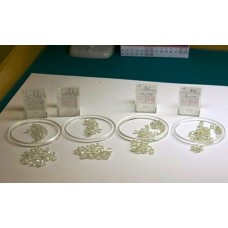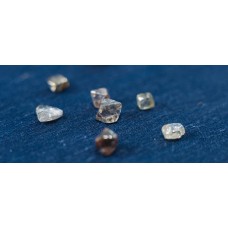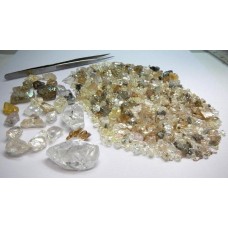NEWS
Lean Production system at Aikhal Division
Aikhal
Mining and Processing Division of Alrosa began implementing tools for the Lean
Production system.
The
5C system is one of the most famous methods of Lean Production. It helps to
organize the workplace correctly, keep it clean, and maintain standards and
discipline. The idea of introducing the 5C system to the Aikhal Division was
born during the visit of Alrosa management to one of the sections of the mining
technological equipment workshop.
To
date, work on three of the stages of the system is being carried out at the
sites of the mining equipment repair shop. These stages are organizing a
workplace, strengthening discipline and creating safe working conditions. The
entire team implements the project.
Premier Gold production over 16K Oz in 4Q
Premier
Gold Mines Limited announces operating results for the three months and year
ended December 31, 2019. The Company previously released its production results
for the fourth quarter.
Premier
is a gold-producer and respected exploration and Development Company with
high-quality precious metal projects in proven, accessible and safe mining
jurisdictions in Canada, the United States, and Mexico. Premier’s team is
focused on creating a low-cost, mid-tier gold-producer from its two producing
gold mines and two advanced-stage, multi-million ounce development projects.
The wide mineralized zones at Wallbridge
Wallbridge
Mining Company Limited announces that it continues to extend intervals of gold
mineralization characterized by wide intersections of 1-2 grams per tonne gold
with narrower zones of high-grade material within the Area 51 vein network in
the immediate hanging wall to the Tabasco/Cayenne shear system on its
100%-owned Fenelon Gold Property.
"The
fact that many of these drill holes intersect multiple potentially mineable
zones in Area 51 as well as the Tabasco/Cayenne shear system makes our drill
program very efficient, allowing for low per-ounce discovery cost," stated
Marz Kord, President & CEO of Wallbridge. "The wide mineralized zones,
particularly near surface such as the 1.17 g/t Au over 70.50 metres in hole
FA-19-098, could become part of a future potential open pit adding significant
amounts of gold ounces to a high-grade underground operation."
Volatility drove gold ETF all-time highs
February
Highlights:
Global
gold-backed ETFs (gold ETFs) and similar products added 84.5 tonnes(t), or net
inflows of US$4.9bn, across all regions in February, boosting holdings to new
all-time highs of 3,033t.1 Combined with a gold price increase of nearly 2%,
assets under management (AUM) grew 4.4% in US dollars during the month,
breaching the previous September 2012 record high.
At
that time, the gold price was 10% higher than current levels, highlighting two
interesting trends: 1) the global growth in gold ETFs outside of the US; and 2)
that US investors have not yet increased their gold allocations as much as they
did in 2012.
Regional
overview:
Market
uncertainty surrounding the potential impact of the coronavirus outbreak on the
global economy drove strong inflows to all regions during the month. North
American funds led regional inflows (+42t, US$2.3bn, 2.9% AUM), while European
funds added 2.8% to assets (+33t, US$2.0bn). Asian funds, primarily in China,
also finished the month with strong inflows, adding 8.7t (US$425mn, 9.5%),
while funds in other regions grew 6%, adding 0.8t and US$132mn.
Price
performance:
The
LBMA Gold Price reached an intra-month high of US$1,672/oz during the last week
of February – levels last seen in 2013 – but gave back some of those gains to
finish the month up 1.6% in US-dollar terms.
Prior
to the late-month move in the markets, leverage in risky assets like stocks
were at a lofty level. Uncertainty around global health and safety and its
potential economic impact caused market volatility and de-risking. The quick,
sharp sell-off in stocks may have caused margin calls – where liquidity
sourcing from assets like gold was required – as stocks finished the month with
the worst weekly performance since the financial crisis.
At
the time of publication, gold has outperformed most major asset classes this
year and is the only one in positive territory at this point, higher by over
8%. Gold’s performance separated itself from broader commodities, once again,
as the broader commodity indices fell between 7% and 11% on the month and oil
(WTI) fell another 15%.
Gold
global trading volumes averaged US$195bn a day in February, an increase of 34%
y-o-y, while futures open interest increased 27% to US$122bn. COMEX net longs4,
via the COT report, hit all-time highs of 1,209t (US$63bn) during the month, a
sign of overall bullish positioning. However, past instances of extreme bullish
and bearish positioning that are not supported by a broader set of investors
have often been followed by price reversals.
Looking
forward:
Multiple
drivers continue to support the demand for gold moving forward. US Treasuries
have been the recipient of risk-off flows. The US 10-year and 30-year bond
rates continue to hit all-time lows, improving the opportunity cost of holding
gold. We have found that lower rates have a positive impact on gold prices and
offer the opportunity for additional gold exposure (potentially replacing
bonds) in a low-rate environment.
Additionally,
the Federal Reserve made a surprise 50bps rate cut in an attempt to ease
concerns about the coronavirus effects. Futures in the US are pricing in a
total of 100bps of cuts in 2020, which would take the target rate down to
50-75bps. The impact of monetary policy on gold highlights how gold tends to
outperform during easing cycles.
Our
2020 Outlook themes remain constant. We expect market risk and slowing economic
growth interaction to impact gold prices, particularly as the financial effects
of the coronavirus are realised. Additionally, lower interest rates, increased
gold price volatility and central bank intervention could continue.
Gold-backed
ETF inflows, alongside central bank purchases and gold reserves, were a large
driver of global gold demand in 2019, despite decreased jewellery and bar and
coin demand – the result of higher gold prices. This dichotomy is likely to
continue as market uncertainty could drive inflows into gold investments, while
economic slowing, particularly in China, could hurt jewellery and technology
demand.
Forevermark Diamond shaped coin
A
diamond's cut shapes the sparkle that makes it an everlasting symbol of love
burning bright. Nowhere is this more evident than with this extraordinary coin,
which was inspired by a diamond… and is shaped like one too! In collaboration
with Crossworks Manufacturing and Forevermark diamonds, this first ever
diamond-shaped coin is an exciting addition to our premium lineup in 2020 by Royal
Canadian Mint.
Its
multi-dimensional shape matches the patented cut of the 0.20-carat Forevermark
Black Label diamond embedded on one of the coin's engraved facets. More than a
year in the making, this diamond-within-a-diamond showpiece is the ultimate
tribute to the magnificence of a perfectly cut Canadian gemstone. It’s a stunning
gift that combines world-class engraving and sophisticated elegance the Forevermark
Diamond coin.
Incentivise Bank Credit Growth
The
Reserve Bank of India (RBI) in the recent monetary policy has tweaked the
liquidity management framework by replacing the daily scheduled repo operation
with long-term repo operation (LTRO). The RBI has additionally announced an
incentive structure for banks to encourage credit flows to the MSME and
consumer segments.
The
agency believes that the measures are encouraging for banks especially in the
current environment. However, the
overall success of the measures is hinged on a low interest elasticity of
demand. Post the announcement, the RBI has already infused INR750 billion
through one LTRO and another two tranches of three-year LTROs. It has also
announced one more auction of INR250 billion for the next three years.
The impact of COVID-19 on De Beers cycle 2
De
Beers Group announced the value of rough diamond sales (Global Sightholder
Sales and Auctions) for the second sales cycle of 2020. De Beers Group today
announced the value of rough diamond sales for the second sales cycle of 2020
remained valued of US$355 million (provisional).
Advances search for the Lulo diamond source
Lucapa
Diamond and its Project Lulo partners Endiama and Rosas & Petalas are on
the search for the hard-rock sources of the high-value alluvial diamonds being mined
at the Lulo diamond project in Angola. Following the highly-encouraging
tributary sampling results set out the Project Lulo partners commenced a
drilling program in the Canguige catchment area targeting five kimberlite pipes
considered prospective to host diamonds, along with two additional priority
anomalies.
Once
the existing priority kimberlites are drilled, kimberlite bulk samples from
these five pipes will be excavated for processing to test for diamonds. The
Canguige catchment is upstream of the Cacuilo River valley, where Lucapa and
its partners have, for several years, been mining some of the world’s
highest-value and quality alluvial diamonds.
2020 platinum supply to exceed over demand by 1.5%
World
Platinum Investment Council (WPIC) published twenty-second Platinum Quarterly
data set, which is examines activity in the fourth quarter and for full year
2019 and includes a new forecast for 2020. Independent analysis is provided by
our research partners: SFA (Oxford) in respect of 2019 and prior years; Metals
Focus in respect of 2020.
Overview
of supply and demand:
The
Foreword to the report provides an overview of supply and demand developments
in the platinum market, as well as our view on issues and trends relevant to
considering exposure to platinum as an investment asset. There is also a short
update on our product partnerships.
White paper published to advance women in mining
A
new White Paper on Women in Mining released by the Minerals Council aims to
streamline the industry’s strategies to advance women in the industry It
focuses, in particular, on improving the representation of women in the sector
and encouraging leaders to make decisions that are in the best interest of
women.
The
White Paper forms part of ongoing work that the Minerals Council, together with
its tripartite partners in government and organised labour, is doing to promote
gender diversity and inclusion at all levels in the workplace. It makes
provision for ensuring that women are given ample opportunity to achieve their
full potential at work, and prioritises the closing of the gender pay gap.













